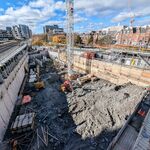Aviation is strategically important to the country as a whole, but not between the major cities of the Windsor-Quebec corridor. Or at least it doesn’t have to be. There’s no reason for flying to be the main way to travel between cities so close together.
...
I did check out Air France’s air-rail integration. Here's their
website on the topic. They quite clearly
do move people to Lyon on the train. In fact, if I plan a trip there on Air France’s website, many of the options include a train from de Gaulle to Lyon - something like a dozen daily trains to choose from. Same goes for Brussels, Strasbourg, Lille, etc. Basically every city served by the TGV within 500 km of Paris that would use de Gaulle as a hub.
Only 5 flights a day serving a route similar to Toronto-Ottawa? That's cute. Air Canada alone has 16 daily flights to Ottawa and 21 to Montreal. If you include Westjet and Porter those numbers go up to 37 and 47. 5 flights a day would be a big drop in traffic.
Like I've said earlier, you'll see a lot of direct o/d traffic move to rail. Even without HSR. You just a service that is reasonably fast downtown-to-downtown with a reasonable fare and a regular (hourly during the day) schedule. And I've also said, you'll see the airlines cut shoulder schedules. But I'm not inclined to believe that you'll see 37 flights go down to half a dozen. Even with HSR. For a few reasons. First, all rail building is focused on downtown-to-downtown travel. Merely having to transfer at Union, will kill a lot of the time savings and convenience of using long distance rail to get to Pearson. Second, is scheduling. Air Canada runs hourly daytime schedules to Ottawa and Montreal because it provides options to business travellers transfering to long-haul. You will not see this change. Unless you can get rail that's time-competitive to Pearson and has a similar schedule to air service today. How much would it cost to get that kind of rail service? Finally, there's cost. Air France is allowed to put a train between Paris and London and make money selling tickets. If we don't allow that for AC, why would they change their business model? And if that rail ticket costs nearly as much as air fare, it's far more efficient for the airline to have the customer processed in Ottawa or Montreal and shuttled by air to Pearson.
Now, none of that means that rail won't steal a good chunk between Toronto-Ottawa and Toronto-Montreal and particularly Ottawa-Montreal. I can see most o/d traffic moving to rail. I think Porter's business case for Ottawa and Montreal will be dramatically diminished. They'll have to become more focused on the US and Northern Ontario.
One huge issue, that you forget about too is cost. More specifically, who bears the cost. From a govermental perspective, it's a no-brainer to expand an airport, because the government isn't paying for it! The passengers pay for airport development and expansions. Rail on the other hand, means billions in government expenditure, and the real risk that profits might not materialize and subsidies will be needed to maintain service.
Serving Sudbury and building a freeway to Sudbury aren’t the same thing. Freeways to such small, isolated cities are very rare outside of two countries in North America. The reason I mentioned it is because if we didn’t build unnecessary remote freeways we’d have more money for more worthy rail projects. In other words, putting a higher percentage of our spending into rail and a lower percentage into roads, like most countries do. It doesn't have to be at the expense of urban transit. But you’re right that 401 expansion is an alternative to the KW-London HSR specifically.
Good luck selling that message and trying to form government. No party is going to win running on a platform that tells northern Ontario that no infrastructure spending is warranted in their direction. That freeway to Sudbury is as valuable to them as the HSR you want in Southern Ontario. And it's simply potlitically unfeasible to push deliberate spending restrictions on rural areas to boost spending on inter-city rail that runs through their backyards. It's just not going to fly. The sooner we accept that, the sooner we can work around it. This is not just for HSR. Goes for all the urban transit we want too.
Well the private sector paying part of the cost is exactly what was expected in previous studies. It’s also part of VIA Rail’s latest plan to build their own corridor. But for the private sector to bother stepping up the process has to proceed to a further point than yet another feasibility study. And you’re right that HSR isn’t very likely for the whole corridor, but this brings me back to my original point. If we’re looking to manage the demand for new and expanded airports then HSR can play a key role.
VIA's CEO would probably defend VIA's bizarre cattle car loading process. I'd take what he says with a grain of salt. VIA used to advocate for HSR until they realized their energy was better spent advocating for something more realistic, like what they're planning now. If their current proposal gets built you can bet they will push for more upgrades.
Paying for a study or even contributing to a $4 billion rail plan is one thing. Contributing to a $20 billion HSR plan is another matter entirely. And the private sector has never said they'll sign up for that. They'll sign up to build it and run it. They won't sign up to finance it. And that's the sticking point. No government is going to want to fund the $16 billion between VIA's current proposal and full HSR. Especially not when that $16 billion buys them so much public transit throughout the country. I'm not even sure, the public would support that. Especially when they know that it's $16 billion less for everything else. This is why I fully agree with VIA's CEO pushing an incremental approach. Far easier to sell HSR when the public is already relying on regular train service. It just sucks that his incremental approach may mean it's 20-30 years before we see real HSR.
High speed rail competes with road just as much as air, as evidenced by the modal split figures in Spain.
Only when subsidized and when gas prices are very high. What would fares be in Spain when you include all construction costs (like we would have to)? And how would that compete in a country where gas is $1/L and free parking is still available in many places?
And as for the TGV struggling, yes airlines will always compete with the train. But the TGV is still making an 8.1% profit despite aggressive expansion (does that figure include commuters carried on the TGV? I genuinely don't know). And they have created a low cost service to compete with the cheap airlines.
Profits in these cases are particularly sketch because the accounting rarely books construction costs completely. There's no way that kind of accounting would be allowed here. Which is what makes the sales pitch for full HSR difficult. And it gets even more challenging in the Canadian context where aviation pays for its own infrastructure. Airport expansion is essentially free and even profitable to government. Should the govenrment insist on pushing HSR, you can bet the airlines will be asking for airport rents to be cancelled. Is the government willing to give up $1b in annual revenue to incur $20 billion in capital expenditure?
Is high speed rail required? Probably not, but it would attract a lot more riders and shift transportation patterns a lot more than the VIA proposal. That said, the VIA proposal is a good start and I hope it gets built in some form. Even taking just an hour off the trip to Montreal could steal a not insignificant amount of business from the airlines.
I would love to have HSR. Honestly, would love to have it. And I'd be cheering if Trudeau announced it tomorrow. However, I've just comes to see less of a business case for it, when the difference in cost (between VIA Fast and full HSR) is so huge and opportunity cost is even bigger. For $20 billion, you could have VIA FAST, the DRL, every LRT planned in Toronto and GO RER. And honestly, VIA Fast is good enough. 2.5 hrs Toronto-Ottawa downtown-to-downtown is competitive with air from Pearson and the Island. 3.5 hrs Toronto-Montreal is only slightly slower than downtown-to-downtown from Pearson. And just 1 hr slower than Porter. Depending on cost, there will be enough traffic swayed.
I am going to bet that VIA Fast will be announced in the new year (by March) and that the feds will call it "high speed" because it's faster than what's there today.




